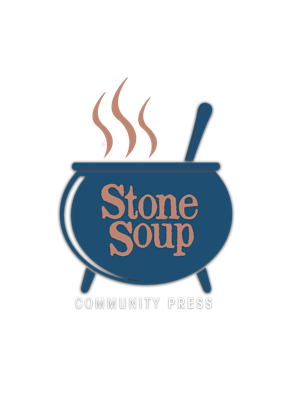Stone Soup Community Press, Inc Submission Guidelines
At Stone Soup Community Press, Inc., we believe the diversity which exists within our community should be reflected in the stories we publish. We accept novella and novel-length works of fiction, as well as non-fiction.
We publish fiction in the following categories:
Fantasy
Erotica
General Fiction
Young Adult
Romance
Mystery
Action/thriller
Science-fiction
We are looking for submissions which step outside the traditional formulas of the sub-genres. We want stories that include all forms of diversity within our community.
We want protagonists of all colors, all ages, all economic statuses, all shapes and sizes, all abilities and health status. We want stories that don't necessarily have a traditional HEA ending. We want protagonists who identify as straight, lesbian, gay, bisexual, transgender, confused, questioning, experimenting, not into labels, etc.
We are looking for diversity in our authors as well. Your sexual orientation, gender identity, color, economic status, health status, etc. doesn't matter so long as you've written a well-crafted and compelling story.
Submission Process
Our submission process requests specific information required for a thorough analysis. We will promptly acknowledge its receipt and let you know within 90 days if we are interested in pursuing rights. The decision to publish is made by our Publishing Selection Committee which is chaired by our Board Editor-In-Chief and member publishers, editors, and authors. Inquires regarding submissions can be made to submissions@stonesoupcommuntiy.com. Please do not make inquiries unless you've not heard from us after 90 days.
We consider a submission of a project to be an offer from the author to enter negotiations for a contract. That means that the person submitting it should have the right to do so, that no other publisher is currently considering its acquisition and that the rights we may wish to acquire are available. As a small press we can't invest the evaluation resources only to find that the project is under contract or otherwise encumbered. For this reason, we cannot accept simultaneous submissions.
Preferred Word Count
Fiction Novels (all sub-genres) 50,000-100,000
Fiction Novellas (all sub-genres) 15,000 - 50,000
Non-Fiction: 30,000-60,000
Manuscript Guidelines
When preparing to submit your manuscript, please make sure it follows the manuscript submission guidelines below:
We accept .rtf and *Scrivener project (preferred) files only.
No Word Docs accepted
Include with your manuscript submission:
A synopsis which includes
Plot summary, including how the story ends, of no more than 750 words
Character and setting description of no more than 250 words
Proposed Word count of your completed manuscript
A short author’s bio which includes
Your legal name
Complete publishing history, if any
All pen names in use
Your complete contact information, including e-mail and a telephone number where it is acceptable to leave a message about your submission
Send us a 25-page sample manuscript. Do not mail us paper copies.
Use 1-inch margins on all sides
Use 12 point Times New Roman, or another clean, legible font
Double-space your manuscript
Triple space scene breaks with ### centered in middle line
Use the “Enter” key to start a new paragraph or a new line of dialogue. Do not use hard returns at the end of a line of text within a paragraph
Do not use “Tabs” in the manuscript. Set your paragraphs to automatically indent on the first line
Use smart (curly/typographic) quotation marks [“ / ” / ‘ / ’] instead of straight quotation marks [” / ‘].
Use smart apostrophes [’] instead of straight apostrophes [‘]
Do not use two spaces after a period
Number all pages
Have the author’s name and title of manuscript on the first page
*Instructions for sending your manuscript as a Scrivener project.
Launch Scrivener and open the project you want to email.
Click the “File” menu, point to “Back Up” and select “Back Up To.”
Click the “Browse” button and select an easy-to-remember location for your project backup file, such as your desktop or documents folder.
Type a name for your project into the “Name” box. By default, Scrivener uses the project’s name along with the current date and time.
Click the “Backup as ZIP” check box if it isn’t already enabled.
Click “OK.” Scrivener creates a single ZIP file containing your project.
Compose a new email message and attach the ZIP backup file to the message.
